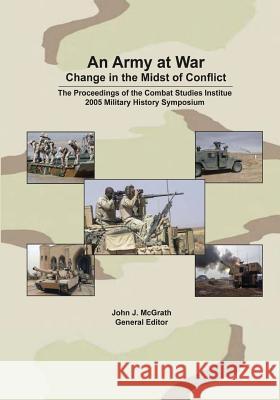An Army at War: Change in the Midst of Conflict » książka
An Army at War: Change in the Midst of Conflict
ISBN-13: 9781494362270 / Angielski / Miękka / 2013 / 688 str.
These proceedings are the third volume to be published in a series generated by the annual military history symposium sponsored by the US Army Training and Doctrine Command (TRADOC). Each year, these conferences bring together both military and civilian historians, as well as formal and informal students of military history, literally from around the world, for the purposes of presenting ideas and points of view on current military issues from a historical perspective. This year's symposium, hosted by the Combat Studies Institute, was held 2-4 August 2005 at Fort Leavenworth, Kansas. The 2005 symposium's theme was An Army at War: Change in the Midst of Conflict. As this title indicates, presentations at this event focused on how an Army changes while concurrently fighting a war. Changing an Army in peacetime is difficult enough. Transformation can include changes to the personnel system, the turning in old and the fielding of new equipment, new training requirements, and at times, learning an entirely new way of viewing the enemy and the battle space in which operations will occur. Practical and cultural changes in an Army always cause tremendous turbulence and angst, both inside and outside of the Army. The United States Army and the nation are facing these challenges today, and they must make these changes not in a peacetime environment, but while fighting the Global War on Terrorism (GWOT). The panelists presented a series of topics addressing the current transformation challenge that ranged from maneuver warfare, to asymmetrical operations, to insurgencies, to logistics, to unit manning, to doctrine and many others. This third collection of proceedings contains the papers and presentations of participating panelists. It also includes transcriptions of the question and answer periods following the panelists' presentations. These annual symposiums are proving to be a key annual event for those students and masters of military history who believe that the past has something useful to provide in the analysis of current military problems.
Zawartość książki może nie spełniać oczekiwań – reklamacje nie obejmują treści, która mogła nie być redakcyjnie ani merytorycznie opracowana.











